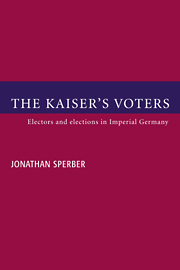3 - The “national” parties
Published online by Cambridge University Press: 22 October 2009
Summary
Parties of government / parties of the “nation”
If the Social Democrats were the party of opposition to the national government in Imperial Germany, and the minority parties consistently in opposition – indeed, the leading element of the opposition – in Bismarckian Germany and sporadically oppositional afterwards, the liberal and conservative parties, by contrast, were the parties of the government. To be a governmental party in the Kaiserreich, though, had a particular meaning in view of the independent position of the executive. In nineteenth-century parliamentary regimes, a party became governmental as a result of the election returns and the construction of a majority parliamentary coalition, but in the Kaiserreich the government was formed independently of the political parties and their appeal to the voters. “Governmental” parties thus agreed to support a government not of their own making and in return received the endorsement and support of the authorities at election time.
Now, not all the liberal and conservative parties were supporters of the government all the time. However, every single one of these parties campaigned in at least one general election as a supporter of the government; and at every individual election at least one of the liberal and one of the conservative parties appealed to the voters as a party of the government. Two such parties, the National Liberals and the Free Conservatives, were consistent supporters of governmental policy through all its twists and turns across the history of the empire. Even the left-liberal parties, which were frequently in opposition to the national government, retained a governmental orientation.
- Type
- Chapter
- Information
- The Kaiser's VotersElectors and Elections in Imperial Germany, pp. 108 - 154Publisher: Cambridge University PressPrint publication year: 1997



